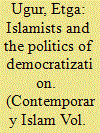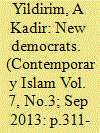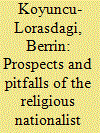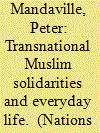| Srl | Item |
| 1 |
ID:
178608


|
|
|
|
|
| Summary/Abstract |
The coup attempt of 2016 constitutes a major incision in contemporary Turkish politics. Focusing on the symbolic aspects of the AKP’s authoritarian rule in the direct aftermath of the coup attempt, this article offers a new conceptual framework to analyze three symbolic and discursive strategies that the government employed with the aim to normalize its exceptional and transformative measures: legitimation, narrativization and ritualization. It argues that these strategies contribute to the deepening of the AKP’s authoritarian regime formation and contends that the government’s actions are a reflection of the power struggle between the AKP and the Gülen movement.
|
|
|
|
|
|
|
|
|
|
|
|
|
|
|
|
| 2 |
ID:
153282


|
|
|
|
|
| Summary/Abstract |
This article offers a regime transition perspective on the complex relationship between Islamism and democratization in Turkey. By using Dankwart Rustow’s four-stage model of democratization, the article traces Islamist strategies of survival, nonconfrontation, offense, and hegemony back to the background condition of national unity, conflict of interest during the preparatory phase, and the requirements of the decision phase to complete a democratic transition. The evidence from Turkey demonstrates that democratization is not a linear process and Islamic actors may use politics of reform to ensure their survival, access to power, and domination.
|
|
|
|
|
|
|
|
|
|
|
|
|
|
|
|
| 3 |
ID:
121884


|
|
|
|
|
| Publication |
2013.
|
| Summary/Abstract |
I analyze the positive and leading role religious actors play in democratic consolidation in Turkey in recent years. I argue that major social changes might lead to such outcomes. Empirically, I show that two major religious actors in Turkey-the Gulen Movement and the Justice and Development Party (AKP)-have adopted favorable positions on EU membership, ethnic and religious minorities, and pluralism in the last decade. This remarkable transformation owes its existence to the economic liberalization reforms initiated in the early 1980s, and the "post-modern coup" of 1997. This transformation reflects the need of both religious actors for greater democracy from a purely self-interested perspective. The Gulen Movement prefers an open and democratic system to sustain its organizational existence. The AKP responds to the preferences of its own constituency. These unique conditions have made two religious actors catalysts of democratization along with some liberal democrats in Turkey. Empirically, I rely on European Union's Turkey progress reports and a recent analysis of religious Turkish media to support the argument.
|
|
|
|
|
|
|
|
|
|
|
|
|
|
|
|
| 4 |
ID:
095484


|
|
|
|
|
| Publication |
2010.
|
| Summary/Abstract |
This article examines the interplay of religion and nationalism in Turkey in the post-1990 period and discusses the prospects and pitfalls of religious nationalist movement by focusing on Glen's Turkish Muslimhood. It is believed that the instrumental relationship between Islam and nationalism in Turkey as exemplified in the modernist religious nationalism of Glen will help reveal that Islam has always been an indispensable element of the discourse of nationalism in Turkey and will force us to rethink the role or religion in Turkish society and politics.
|
|
|
|
|
|
|
|
|
|
|
|
|
|
|
|
| 5 |
ID:
102822


|
|
|
|
|
| Publication |
2011.
|
| Summary/Abstract |
Discussions of globalisation and identity have focused on the renewed relevance of various post-national frameworks of belonging, including the Muslim umma. This article argues against the idea that the umma has come to constitute a primary referent in contemporary Muslim debates about identity or a form of globalised political consciousness. Furthermore, the advent of 'post-Islamism' means that Islamic political mobilisation rarely seeks to establish alternative political orders within the container of the nation-state. However, this does not mean that we are seeing a reaffirmation of the nation in Muslim contexts today. Rather, transnational Muslim solidarities represent an intermediate space of affiliation and socio-political mobilisation that exists alongside and in an ambivalent relationship with the nation-state. I point to two different socio-religious movements that, without positing the primacy or exclusivity of the umma/Islamic identity, express discrepant visions of the relationship between Islam and the nation: (1) the Fethullah Gülen movement, which serves simultaneously as the vehicle for a particular vision of neo-Ottoman Turkish nationalism and a critique of the Kemalist national order; and (2) the neo-Salafist movement, read here as an effort to embed conceptions of public morality and accountability within the discursive tradition of orthodox Islam rather than the institutional framework of modern polity.
|
|
|
|
|
|
|
|
|
|
|
|
|
|
|
|